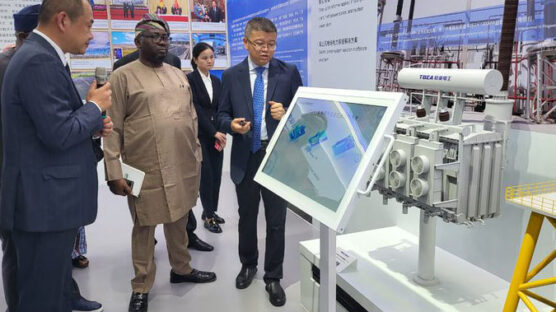The federal government has announced plans to allocate $800 million for the construction of substations and distribution lines under the Presidential Power Initiative.
The funds will be distributed between Lot 2, covering Benin, Port Harcourt, and Enugu Distribution Companies (DISCOs), and Lot 3, covering Abuja, Kaduna, Jos, and Kano DISCOs.
The Minister of Power, Adebayo Adelabu, made the announcement during a facility tour of TBEA Southern Power Transmission and Distribution Industry in Beijing, China, a statement said on Sunday.
According to the statement, the minister disclosed that $400 million would be allocated for the construction of substations under Lot 2, and another $400 million for substations and distribution lines under Lot 3.
Lot 2 covers the franchise areas of the Benin, Port Harcourt, and Enugu Distribution Companies (DISCOs), while Lot 3 encompasses the franchise areas of the Abuja, Kaduna, Jos, and Kano DISCOs. The funds are part of a broader effort to improve power distribution infrastructure across Nigeria.
The minister’s visit to China coincided with his attendance at the China-Africa Cooperation Summit. He noted that on Friday, August 30th, power generation peaked at 5,170 megawatts but had to be reduced by 1,400 megawatts due to the DISCOs’ inability to take up the supply.
“This is truly regrettable, considering that the government is on course to increase generation to 6,000 megawatts by the end of the year,” he said.
During an interactive session with TBEA’s management, Adelabu assured that the federal government is committed to partnering with world-class organisations like TBEA to achieve President Bola Tinubu’s Renewed Hope vision for the power sector, particularly in transmission and distribution, as well as in renewable energy development.
Addressing the challenges in the power sector, the minister noted that the outdated and dilapidated transmission and distribution infrastructure has been a significant factor behind the country’s unreliable power supply.
“This has led to the historical epileptic supply of power to households, industries, and businesses,” he said, further revealing that over 59 percent of industries in Nigeria operate off the national grid due to its unreliability.
Adelabu stressed the government’s determination to transform the power sector, stating that several initiatives have commenced to restore confidence among power consumers, particularly industries.
He recalled that in 1984, Nigeria generated 2,000 megawatts of power, and it took over 35 years to add another 2,000 megawatts. However, since the current administration took office last year, power generation has increased to 5,170 megawatts, with an additional 1,000 megawatts added within the first year.
“Our plan is to achieve 6,000 megawatts of power by the end of the year through a combination of hydroelectric power plants and gas-fired power plants. We are also targeting 30 gigawatts of power by 2030, with 30 percent of that being renewable energy,” he explained.
The Minister also mentioned that renewable energy will be sourced from small hydroelectric dams, solar energy, and both onshore and offshore wind farms. He acknowledged that the current state of the national grid is insufficient to support the government’s vision for the power sector, thus necessitating the construction of the Western and Eastern super grids.
He added that TBEA is not new to Nigeria, citing the company’s ongoing work with the Omotosho Power Plant in Ondo State, which is owned by the Niger Delta Power Holding Company.
In response, TBEA’s representative, Hanjie, commended the Minister for improvements in the power sector, including enhanced generation and transmission since he assumed office. He expressed TBEA’s willingness to collaborate with the Nigerian government to achieve its short-term goal of reaching 6 gigawatts by December 2024 and the long-term target of 30 gigawatts by 2030, contributing to the ongoing power sector revolution in the country.

